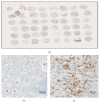Tumor-Associated CD204-Positive Macrophage Is a Prognostic Marker in Clinical Stage I Lung Adenocarcinoma
- PMID: 29850577
- PMCID: PMC5926519
- DOI: 10.1155/2018/8459193
Tumor-Associated CD204-Positive Macrophage Is a Prognostic Marker in Clinical Stage I Lung Adenocarcinoma
Abstract
Objective: Macrophages are the dominant leukocytes in the tumor microenvironment. Accumulating evidence revealed that CD204-positive (CD204+) tumor-associated macrophages (TAMs) are associated with the aggressive behavior of various cancers; however, the clinical, pathological, and prognostic associations of CD204+ TAMs with the subtype of lung adenocarcinoma have not been reported.
Methods: Tissue microarray and immunohistochemistry were constructed from clinical stage I lung adenocarcinomas with radical surgical resection. The intratumoral density of CD204+ cells was calculated using image analysis software for analyses. Survival analyses were performed using the Kaplan-Meier method and multivariate Cox proportional hazards regression models.
Results: The intratumoral density of CD204 was correlated with T stage, nodal involvement, lymphovascular invasion, and cancer relapse after the surgery, but not with age, gender, or smoking history. The density of CD204 in non-LPD was significantly higher than that in LPD. The 5-year disease-free survival (DFS) rate of CD204 high-density group was significantly worse than that of CD204 low-density group.
Conclusions: The expression of CD204 in TAMs is associated with the aggressiveness of lung adenocarcinoma. Our results suggest that a specific immune microenvironment may be associated with the biological behavior of lung adenocarcinoma.
Figures



References
-
- Travis W. D., Brambilla E., Noguchi M., et al. International association for the study of lung cancer/American Thoracic Society/European Respiratory Society: international multidisciplinary classification of lung adenocarcinoma: executive summary. Proceedings of the American Thoracic Society. 2011;8(5):381–385. doi: 10.1513/pats.201107-042st. - DOI - PubMed
MeSH terms
Substances
LinkOut - more resources
Full Text Sources
Other Literature Sources
Medical

